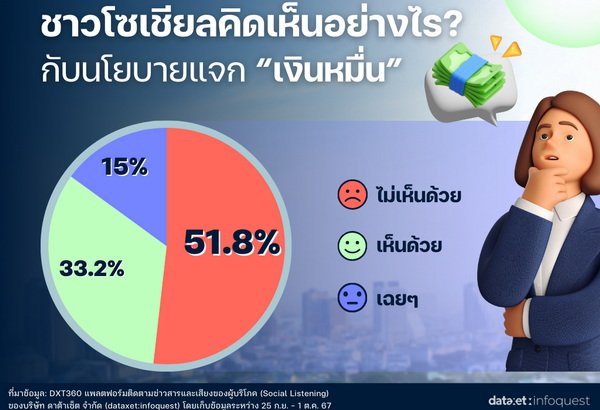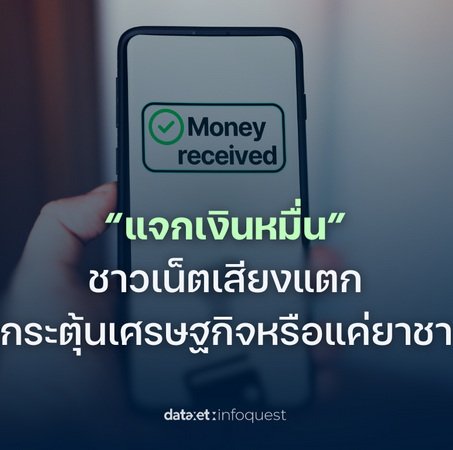โครงการแจกเงิน 10,000 บาท ให้แก่ประชาชนกลุ่มเปราะบางเพื่อกระตุ้นเศรษฐกิจ ซึ่งปรับเปลี่ยนรูปแบบมาจาก “ดิจิทัล วอลเล็ต” ได้ก่อให้เกิดประเด็นถกเถียงในสังคมออนไลน์ มีทั้งฝ่ายที่มองว่าเป็นแรงกระตุ้นให้เกิดการใช้จ่ายและยกระดับคุณภาพชีวิต ขณะที่อีกฝ่ายเห็นว่าเป็นเพียงการกระตุ้นเศรษฐกิจระยะสั้นไม่ยั่งยืนพร้อมทั้งกังวลถึงผลกระทบระยะยาว โซเชียลมีเดียกลายเป็นพื้นที่แลกเปลี่ยนความคิดเห็นอย่างคึกคัก สะท้อนให้เห็นถึงความสนใจอย่างมากของผู้คนที่มีต่อนโยบายนี้
บริษัท ดาต้าเซ็ต จำกัด ได้ทำการรวบรวมข้อมูลผ่านเครื่องมือ DXT360 เพื่อฟังเสียงในสื่อสังคมออนไลน์ (Social Listening) ในช่วงวันที่ 25 กันยายน – 1 ตุลาคม 2567 ถึงประเด็นเกี่ยวกับ “โครงการกระตุ้นเศรษฐกิจปี 2567 ผ่านผู้มีบัตรสวัสดิการแห่งรัฐและผู้พิการ” พบว่ามีกระแสวิพากษ์วิจารณ์อย่างคึกคักในโลกออนไลน์ โดยผู้ใช้โซเชียลมีเดียจำนวนมากแสดงความคิดเห็นอย่างหลากหลาย ทั้งการวิจารณ์ตัวนโยบาย และการแบ่งปันไอเดียการใช้เงินที่ได้รับว่าจะนำเงินไปใช้จ่ายกับอะไรบ้าง? สะท้อนให้เห็นถึงมุมมองที่แตกต่างของประชาชนที่มีต่อมาตรการนี้

ส่องไอเดียโซเชียลใช้ “เงินหมื่น” ไปกับอะไร ?
จากข้อมูลที่รวบรวมได้ในโซเชียลมีเดีย พบว่าประชาชนส่วนใหญ่วางแผนจะนำเงินไปใช้จ่ายค่อนข้างหลากหลาย โดยส่วนใหญ่จะนำเงินไปซื้อสินค้าอุปโภคบริโภคที่จำเป็นในชีวิตประจำวันมากที่สุด รองลงมาคือนำเงินที่ได้รับไปชำระหนี้ การต่อยอดลงทุนโดยเฉพาะการซื้ออุปกรณ์ที่สามารถนำไปใช้ประกอบอาชีพเพื่อสร้างรายได้เพิ่ม และอื่น ๆ โดยสามารถแบ่งสัดส่วนการใช้จ่ายได้ดังนี้:
1.สินค้าอุปโภคบริโภค: 47.8%
– อาหาร เครื่องดื่ม ของใช้ในครัวเรือน ข้าวสาร อาหารแห้ง เครื่องปรุง
– สินค้าเพื่อการเกษตร (ปุ๋ย ยาฆ่าแมลง อุปกรณ์การเกษตร พันธุ์พืช สัตว์เลี้ยง)
– เครื่องใช้ไฟฟ้า/อุปกรณ์อิเล็กทรอนิกส์
– เสื้อผ้า/เครื่องแต่งกาย
2.ชำระหนี้สิน: 17.4%
– ใช้หนี้ จ่ายหนี้ ชำระหนี้ต่างๆ
3.ลงทุน: 9.6%
– ซื้อทอง เก็บเงิน ลงทุนในอุปกรณ์ทำมาหากิน ซื้อสลากออมสิน
4.เงินสำหรับการรักษาและซ่อมบำรุง: 8.7%
– ค่ารักษาพยาบาล ยา อุปกรณ์การแพทย์ ทำฟัน
– วัสดุซ่อมแซมบ้าน
5.อื่นๆ: 16.5%
– ชำระค่าสาธารณูปโภค
– ทำบุญ/บริจาค
– ใช้จ่ายเพื่อการศึกษา

ชาวโซเชียลคิดเห็นอย่างไร ? กับนโยบายแจกเงินหมื่น
ความคิดเห็นของประชาชนต่อนโยบายนี้มีทั้งเห็นด้วยและไม่เห็นด้วย สะท้อนให้เห็นถึงความคาดหวังและข้อกังวลที่มีต่อผลกระทบในระยะยาว โดยสามารถแบ่งความคิดเห็นออกเป็น 3 กลุ่มหลัก ได้แก่
กลุ่มที่ไม่เห็นด้วยกับนโยบาย: 51.8%
* กังวลเรื่องภาระหนี้สาธารณะที่จะเกิดขึ้นในอนาคต และผลกระทบต่อเสถียรภาพทางการคลัง เนื่องจากเป็นการใช้จ่ายที่ไม่ก่อให้เกิดผลิตภาพในระยะยาว อาจส่งผลให้เกิดภาวะเงินเฟ้อและภาระทางการคลังแก่คนรุ่นต่อไป
* มองว่าการคัดกรองผู้ได้รับสิทธิ์ไม่มีประสิทธิภาพ ทำให้คนที่ไม่ได้เดือดร้อนจริงได้รับเงิน ในขณะที่คนที่เดือดร้อนไม่ได้รับ สะท้อนถึงความไม่เป็นธรรมและความล้มเหลวในการบริหารจัดการข้อมูล
* เห็นว่าเป็นการแก้ปัญหาที่ไม่ยั่งยืน และอาจสร้างวัฒนธรรมการพึ่งพารัฐบาลมากเกินไป ทำให้ประชาชนขาดแรงจูงใจในการพัฒนาตนเองและพึ่งพาตนเอง
* วิพากษ์วิจารณ์การใช้จ่ายเงินอย่างไม่เหมาะสมของผู้ได้รับ เช่น เล่นการพนัน ซื้อของฟุ่มเฟือย
* ต้องการให้นำงบประมาณไปใช้ในการพัฒนาโครงสร้างพื้นฐานหรือการลงทุนระยะยาวแทน เนื่องจากมองว่ามีความยั่งยืนต่อการกระตุ้นเศรษฐกิจมากกว่า
กลุ่มที่เห็นด้วยกับนโยบาย: 33.2%
– มองว่าเป็นการช่วยเหลือผู้ที่เดือดร้อนจริง ๆ เพราะสามารถช่วยบรรเทาความเดือดร้อนของผู้มีรายได้น้อยและช่วยยกระดับคุณภาพชีวิตได้
– เห็นว่าเป็นการกระตุ้นเศรษฐกิจ ทำให้เงินหมุนเวียนในระบบ ซึ่งจะช่วยให้ธุรกิจขนาดเล็กและร้านค้าท้องถิ่นได้รับประโยชน์
– เชื่อว่าเป็นการคืนภาษีให้ประชาชน และรัฐบาลมีความตั้งใจดีในการช่วยเหลือประชาชน แสดงให้เห็นถึงความเข้าใจในปัญหาและความต้องการของประชาชน
– มองว่าการให้เป็นเงินสดดีกว่า เพราะประชาชนสามารถนำไปใช้ได้ตามความจำเป็น ให้อิสระในการบริหารจัดการเงินตามสถานการณ์ของแต่ละครอบครัว
– สนับสนุนให้มีนโยบายแบบนี้ต่อไปเรื่อย ๆ เพื่อช่วยเหลือประชาชน เพราะเห็นว่าเป็นวิธีที่ตรงจุดและเข้าถึงประชาชนได้อย่างรวดเร็ว
กลุ่มที่เป็นกลาง: 15.0%
– เข้าใจความจำเป็นในการช่วยเหลือผู้เดือดร้อน แต่เสนอให้มีการปรับปรุงระบบการคัดกรองให้มีประสิทธิภาพมากขึ้น เพื่อให้ความช่วยเหลือถึงมือผู้ที่ต้องการจริงๆ และลดความไม่เป็นธรรมในการจัดสรรทรัพยากร
– มองว่าควรมีการติดตามและประเมินผลนโยบายอย่างใกล้ชิด เพื่อปรับปรุงให้เกิดประโยชน์สูงสุด โดยพิจารณาทั้งผลกระทบระยะสั้นและระยะยาวต่อเศรษฐกิจและสังคม
– เสนอให้มีมาตรการควบคุมการใช้จ่ายเงินให้เป็นไปตามวัตถุประสงค์ของนโยบาย เช่น การกำหนดประเภทสินค้าและบริการที่สามารถใช้จ่ายได้ หรือการให้เป็นเครดิตสำหรับค่าใช้จ่ายจำเป็นเท่านั้น
– แนะนำให้พิจารณาทางเลือกอื่นๆ ในการช่วยเหลือประชาชน เช่น การสร้างงาน หรือการพัฒนาทักษะ ซึ่งอาจเป็นวิธีที่ยั่งยืนกว่าในการยกระดับคุณภาพชีวิตของประชาชน
– เห็นว่าควรมีการสื่อสารและให้ความรู้แก่ประชาชนเกี่ยวกับการใช้จ่ายเงินอย่างมีประสิทธิภาพ เพื่อให้เกิดประโยชน์สูงสุดต่อตนเองและครอบครัว
อย่างไรก็ตาม แม้ว่าความคิดเห็นต่อนโยบายนี้จะแตกต่างกัน แต่ยังมีประชาชนจำนวนมากที่รอคอยและหวังจะได้รับประโยชน์จากมาตรการนี้ และประชาชนยังให้ความสนใจเรื่องความโปร่งใสในการดำเนินนโยบาย การเปิดเผยข้อมูลผลการดำเนินนโยบายอย่างชัดเจน และการเปิดรับฟังความคิดเห็นจากทุกภาคส่วน ซึ่งทั้งหมดนี้ล้วนเป็นสิ่งสำคัญในการปรับปรุงและพัฒนานโยบายให้ตอบโจทย์ความต้องการของประชาชนได้อย่างแท้จริง และส่งผลดีต่อระบบเศรษฐกิจของประเทศในภาพรวม
ข้อมูลทั้งหมดที่นำมาวิเคราะห์หา Insight รวบรวมข้อมูลจาก DXT360 (Social Listening and Media Monitoring Platform) ของบริษัท ดาต้าเซ็ต จำกัด (dataxet:infoquest) โดยเก็บข้อมูลระหว่าง 25 กันยายน – 1 ตุลาคม 2567
Giving away ten thousand baht Netizens have divided opinions Stimulate the economy or just anesthesia?
The 10,000 baht handout project for vulnerable groups of people to stimulate the economy, which was adapted from a “digital wallet”, has sparked debate on social media. Some see it as a stimulus for spending. pay and improve the quality of life, while the other side sees it as only a short-term economic stimulus that is not sustainable and is concerned about the long-term impact. Social media has become a lively place for exchanging ideas, reflecting the great interest of People who support this policy
Dataset Company Limited has collected data through the DXT360 tool to listen to voices on social media (Social Listening) during September 25 – October 1, 2024 on the issue of ” Economic Stimulus Project 2024 through State Welfare Card Holders”. and the disabled” There was a lively stream of criticism online, with many social media users expressing various opinions, both criticizing the policy and sharing ideas on how to spend the money they received. ? Reflecting the different views of the public on this measure.
Take a look at social media ideas on what to spend “ten thousand baht” on ?
From the data collected on social media, it was found that most people plan to spend their money in a variety of ways. Most of them will use the money to buy consumer goods that are necessary for daily life, followed by spending money that Received to pay off debts, expand investments, especially purchasing equipment that can be used for occupations to generate additional income, etc. The spending can be divided into the following proportions:
1.Consumer goods: 47.8%
– Food, drinks, household items, rice, dried food, seasonings
– Agricultural products (fertilizers, pesticides, agricultural equipment, plant varieties, pets)
– Electrical appliances/electronic devices
– Clothing/Apparel
2.Debt payment: 17.4%
– Pay off debts, pay off debts, pay off various debts
3.Investment: 9.6%
– Buy gold, save money, invest in equipment for earning a living, buy Government Savings Bank lottery tickets.
4.Money for maintenance and repair: 8.7%
– Medical expenses, medicine, medical equipment, dental care
– Home repair materials
5.Others: 16.5%
– Pay utility bills
– Make merit/donate
– Spend on education
What do social media users think about the policy of giving away 10,000 baht ?
Public opinion on the policy is mixed, reflecting expectations and concerns about its long-term impact. Opinions can be divided into three main groups:
Group that disagrees with the policy: 51.8%
Concerns about the future public debt burden and its impact on fiscal stability, as it is a long-term non-productive expenditure that may lead to inflation and fiscal burden for future generations.
It is believed that the screening of eligible persons is ineffective, causing those who are not truly in need to receive money while those who are in need do not, reflecting unfairness and failure in data management.
It is seen as an unsustainable solution and may create a culture of excessive reliance on the government, causing people to lose motivation to develop themselves and rely on themselves.
Criticize the recipient’s inappropriate spending, such as gambling or buying extravagant items.
They want the budget to be used for infrastructure development or long-term investment instead, as they see it as more sustainable in stimulating the economy.
Group that agrees with the policy: 33.2%
It is considered a way to help those who are truly in need because it can help alleviate the suffering of low-income earners and improve their quality of life.
It is seen as stimulating the economy, getting money circulating in the system, which will benefit small businesses and local shops.
It is believed that this is a tax refund to the people and that the government has good intentions in helping the people, showing its understanding of the problems and needs of the people.
They believe that giving cash is better because people can use it as needed, giving them freedom to manage their money according to their family’s situation.
Support the continuation of this kind of policy to help the people because it is seen as a direct method that can reach the people quickly.
Neutral group: 15.0%
Understand the need to help those in need, but propose improving the screening system to be more efficient, so that assistance reaches those who really need it and reduce unfairness in resource allocation.
It is believed that policies should be closely monitored and evaluated in order to make improvements for maximum benefit, considering both short-term and long-term impacts on the economy and society.
It is proposed to have measures to control spending in accordance with policy objectives, such as specifying the types of goods and services that can be spent or providing credit only for necessary expenses.
It is recommended to consider other alternatives to help people, such as job creation or skills development, which may be more sustainable ways to improve people’s quality of life.
It is believed that there should be communication and education for the public about how to spend money efficiently in order to maximize the benefits for themselves and their families.
However, despite differences in opinions on this policy, there are still many people waiting and hoping to benefit from this measure, and the people are also interested in the transparency of policy implementation and the timely disclosure of policy implementation results. Clarity and openness to listen to opinions from all sectors, all of which are important in improving and developing policies to truly meet the needs of the people and have a positive effect on the country’s overall economic system.
All data analyzed for insights are collected from DXT360 (Social Listening and Media Monitoring Platform) of Dataset Co., Ltd. (dataxet:infoquest) , collected between 25 September – 1 October 2024.









